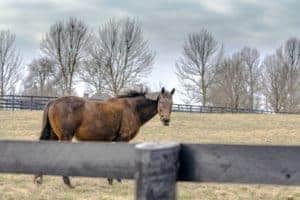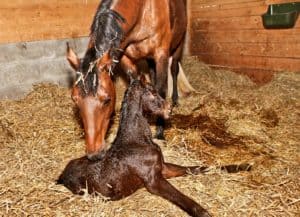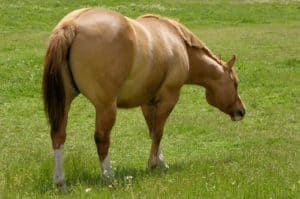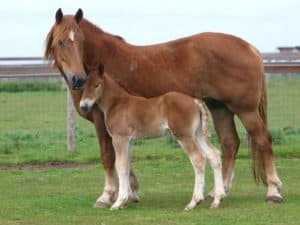
How Can I Tell if a Mare is Pregnant?
An equine reproduction specialist reviews signs that suggest a mare is in foal and how to find out definitively.

An equine reproduction specialist reviews signs that suggest a mare is in foal and how to find out definitively.

Age can affect a stallion’s fertility and his ability to settle mares. Reproduction specialist Dr. Ryan Ferris explains.

Is your mare’s competitive career progressing, but you’d like to get a foal from her? Dr. Ryan Ferris gives an overview of how much time a mare needs off training for assisted reproductive techniques, such as embryo transfer.

Dr. Ryan Ferris explains the purpose of using Caslick’s on certain mares and how they can improve mare fertility.

A reader’s mare is due to foal in March. Should the mare be dewormed again before she foals? An equine reproduction specialist responds.

Learn about what vaccines a broodmare should receive during gestation and why vaccinating mares is important for their foals from equine repro expert Dr. Ryan Ferris.

Get your questions answered about breeding mares and stallions and producing top-quality, healthy foals during our live Q&A. We cover everything from selecting the right parents to gestational care to ensuring your foal’s safe delivery.

Is it safe to breed a mare who has equine metabolic syndrome and a history of laminitis? Reproduction expert Dr. Ryan Ferris offers insight.

Equine reproduction specialist Dr. Ryan Ferris explains basics new horse breeders need to know, including mare estrus cycles and selecting fresh vs. frozen semen.

Dr. Ryan Ferris explains the different meanings of “foundation mare” for a reader who owns one but isn’t sure what the term means.

Learn about the steps involved in embryo transfer from CSU’s Dr. Ryan Ferris.

Artificial light exposure can bring a mare into estrus earlier in the season. Dr. Ryan Ferris of CSU explains.

Some mares are “quiet” when in estrus, making them more difficult to breed. Dr. Ryan Ferris of CSU offers advice.
The horse I’m interested in buying is a cryptorchid. I really like the horse–should I not consider buying him?
Stay on top of the most recent Horse Health news with
© 2022 Copyright Statement dolor sit amet, consetetur sadipscing User Terms, sed diam nonumy eirmod tempor invidunt ut labore et dolore magna aliquyam erat, sed diam voluptua. At vero eos et accusam et justo duo dolores et ea rebum. Stet clita kasd gubergren, no sea takimata sanctus est Lorem ipsum dolor sit amet.